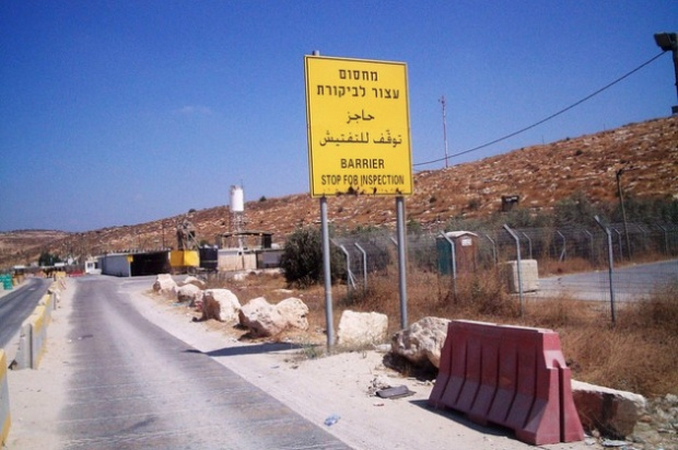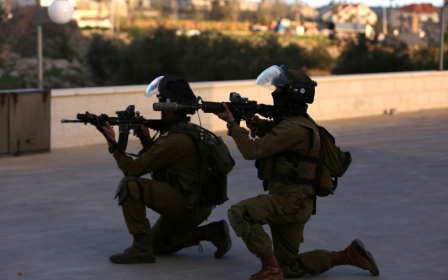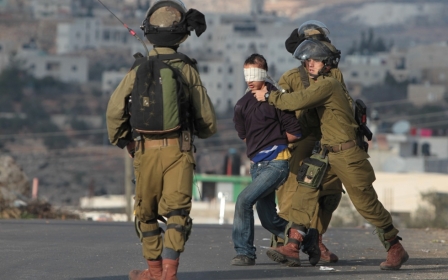Palestinian drivers pay the price as Israeli police patrol West Bank

BETHLEHEM, West Bank - Jeryes was driving from Ramallah to Bethlehem in the occupied West Bank a few weeks ago when he was stopped by Israeli police accompanied by Israeli soldiers. Full of dread, he was well aware what even just a basic traffic stop could lead to in the occupied Palestinian territory.
Jeryes, a resident of Bethlehem who declined to give his real name for fear of reprisal due to his ongoing case, told Middle East Eye that when he asked the officers what he had done wrong, he was yelled at in Hebrew, which he does not understand, and the police proceeded to carry out a search of his car and person at gunpoint.
This time, the police did not fine him for anything or even explain why the search was being carried out, but he estimates that in recent years he has paid at least 900 shekels ($235) in traffic fines to Israeli police. Much of that has occurred in stops immediately around areas under Palestinian jurisdiction, where Israeli police wait in order to nab Palestinian drivers for offences that are legal under Palestinian law but illegal under Israeli law.
The complex situation affects not only those who travel long distances, but also often just those driving down the street or to the next town. An average car trip between two cities or villages in the West Bank generally takes a Palestinian through a bewildering array of legal zones under the control of at least five different kinds of authorities and forces them to navigate two different systems of traffic law.
To travel the one-hour trip from Ramallah to Bethlehem, for example, drivers have to pass through three different legal and territorial zones under a total of five different regulating authorities. While both Ramallah and Bethlehem, like other major Palestinian cities, are in Area A - under full Palestinian security and civilian control - the areas between them are either a mixture of Palestinian and Israeli control or are fully under Israeli control.
When Israel and the Palestinians signed the Oslo Accords in 1993, the Palestinian Authority (PA) took limited security and civilian control in the urbanised areas of the West Bank where the majority of residents live - now called Area A - while Israeli forces maintained varying levels of security and civilian control in the rest, called Areas B and C, that today cover more than 80 percent of the region.
Israeli police can thus legally fine Palestinian drivers throughout the West Bank, but Palestinians - as subjects of military law living in a territory under foreign military occupation - have little ability to contest tickets, and experts say they are intentionally kept in the dark about the limited options available to them.
Instead, they are subjected to the fines and punishments of Israeli civilian law, in addition to military law, without the parallel extension of rights to defend themselves available to Israeli citizens. The result is an entrenchment of Israel’s 48-year old military occupation of the region and yet another legal and financial burden imposed on a people already bludgeoned by decades of military rule.
‘One rule, two legal systems’
While traffic law is enforced upon Palestinians through military courts, Israeli Jews living in the same territory have access to civilian courts in equivalent cases.
The Association for Civil Rights in Israel (ACRI) released a report late last year entitled “One Rule, Two Legal Systems” that highlighted how Palestinians and Jewish Israelis - including the approximately 550,000 living in Jewish-only settlements scattered across the territory - are subjected to completely different legal systems.
For Palestinian drivers in the West Bank, they must navigate not only Palestinian traffic police and security forces, but also Israeli police, Israeli border guards, and/or the Israeli military itself.
The result is a bewildering collection of laws and legal systems that all together resembles a chaotic but highly efficient system of extortion. This is particularly true since the military courts in which Palestinians are tried have been found to rule against Palestinians in nearly 100 percent - 99.74 in 2010, for example - of cases brought before them.
These courts are also often conducted exclusively in Hebrew, a language few Palestinians can speak or understand, with informal intervention by bilingual lawyers or lawyers being the only way to help the accused understand the proceedings.
Even the physical tickets given to Palestinians and Israelis are completely different, with those given to Palestinians lacking the telephone numbers of police stations and traffic courts where they could contest the tickets, unlike those given to Israelis.
“While this might appear to be merely a technical difference,” the ACRI report argues, “it points to the gap between the different judicial systems that apply to Israelis and Palestinians in the West Bank: one of them welcomes questions and enquiries, while the other makes it clear that it is not its duty to be at the service of the resident and undermines his or her ability to seek information.”
Jamal Rayyan, a minibus driver who has worked the Ramallah-Bethlehem line for the last 15 years, told MEE that drivers are “constantly afraid” when they travel through Israeli-controlled areas.
He noted that the punishments for breaking Israeli law are much stricter for Palestinians than Israelis.
“For Jewish Israelis, they just give you a fine and say ‘see you later’. For Arab Palestinians, they impound your car.”
The ACRI report confirms that punishments are generally much stricter for Palestinians. The police are not authorised to impound cars owned by Israelis, for example, but regularly impound Palestinian cars for minor infractions like unpaid tickets.
While the monetary amount of fines given to Jewish Israelis and Arab Palestinians are the same, the punishment falls much harder on Palestinians in the West Bank, where the average per capita income is about one-tenth than that of Israelis, according to ACRI.
Rayyan told MEE that a colleague of his at the Bethlehem Bus Station was recently stopped by Israeli police because he had allowed a passenger to ride with a small child on her lap, incurring a 1,000 shekel ($260) fine for allowing too many passengers in the car.
His van was confiscated for a month and he was forced to pay an additional 70 shekels ($20) for each day it was kept at a lot, Ahmad said. The result was a month of unemployment and a series of fines many times greater in value than his monthly salary.
Tamar Feldman, an Israeli rights lawyer who is the director of the West Bank and Gaza department at ACRI, told MEE that for many Palestinians, Israel’s application of traffic law through the military courts means that often minor violations end up causing major problems like debt, unemployment and impoverishment.
“Thousands of Palestinians are being brought before the court each year, and their ability to defend themselves against these accusations is extremely low. So they end up just getting increased fines. This whole kafkaesque turn of events can start with a simple traffic offence that leads to a small fine and then kind of rolls and rolls and it all happens very quickly,” she told MEE.
“The fact that they apply it in a way that seems arbitrary or unfair or unjust is not surprising,” she added.
“The whole issue with applying traffic law to Palestinians in this way is very much absurd.”
Military and settler collusion in policing
Palestinian experiences with traffic violations include yet another layer of law to navigate due to frequent collaboration of civilian and military authorities in stopping Palestinian on the road. The military - which has a history of killing locals with what Amnesty International has called “virtual impunity” - often stops Palestinians who are then searched by police, in a collusion of civilian and military authority that leaves them almost powerless to defend themselves or argue their case.
The Israeli military said in a statement emailed to MEE that their soldiers have no jurisdiction in enforcing traffic regulations, raising the question of whether the regular use of military personnel to intimidate Palestinians at traffic stops contradicts their own regulations.
Navigating both military and police authority is complicated further by armed Israeli settlers who take it upon themselves to enforce the law as well.
A Bethlehem minibus driver who gave his name as only Muhammad told MEE that a major nuisance he faces at work is Israeli settlers who take the law into their own hands.
The half-million Israeli settlers living in the West Bank are allowed to carry firearms - which is strictly illegal for Palestinians - and use many of the same roads as Palestinians, although the government also maintains a network of essentially Israeli-only roads as well.
Muhammad said that he had been forced to stop multiple times by angry settlers who threatened him for engaging in minor traffic violations like passing and subsequently called the police on him, who inevitably brought military personnel to the scene as well.
“They’ll attack you, yell at you, and even get out and try to fight with you if they want,” he told MEE, noting that a settler even once confiscated his identity card and car registration.
‘I’m afraid of traveling’
Moving from jurisdiction to jurisdiction, from checkpoint to checkpoint, the layered and legally muddled traffic citations only help reinforce the sense many Palestinians have of being cooped up in a prison, a "surplus people" held in a few scattered open-air cells with few rights and little hope for a future.
While in urban areas Palestinians may enjoy a limited sense of having some control over their lives and future, it is less than a 15-minute drive in any direction - and often less - from the centre of any “sovereign” Palestinian area before Israeli authorities are again in control.
The diverse array of restrictions on Palestinian movement applied by military authorities have created an archipelago of isolated cantons in the occupied territories despite international hopes for an independent Palestinian state.
Although physical barriers on movement like checkpoints, closures, fences and walls have previously received attention in the international press, the creation of less visible restrictions like temporary checkpoints and the application of a highly complex and extremely expensive system of traffic laws have just as much - if not more - of an impact on the ability of Palestinians to persist in their homeland.
Jeryes, the Bethlehem local reportedly stopped and searched by police for no apparent reason, told MEE that he has become used to limiting his travel outside of the small island of Palestinian control he lives in - an area not more than a few square kilometres - for fear of encountering Israeli authorities.
“I don’t go to many of the places I used to go or where I would go with my family for picnics when I was young, because I’m afraid I’ll get in trouble for some small thing,” he told MEE.
“I am always afraid of accidentally driving into a checkpoint or settlement and being stopped because they think I shouldn’t be there. I’m always afraid of them.”
Stay informed with MEE's newsletters
Sign up to get the latest alerts, insights and analysis, starting with Turkey Unpacked
Middle East Eye delivers independent and unrivalled coverage and analysis of the Middle East, North Africa and beyond. To learn more about republishing this content and the associated fees, please fill out this form. More about MEE can be found here.




